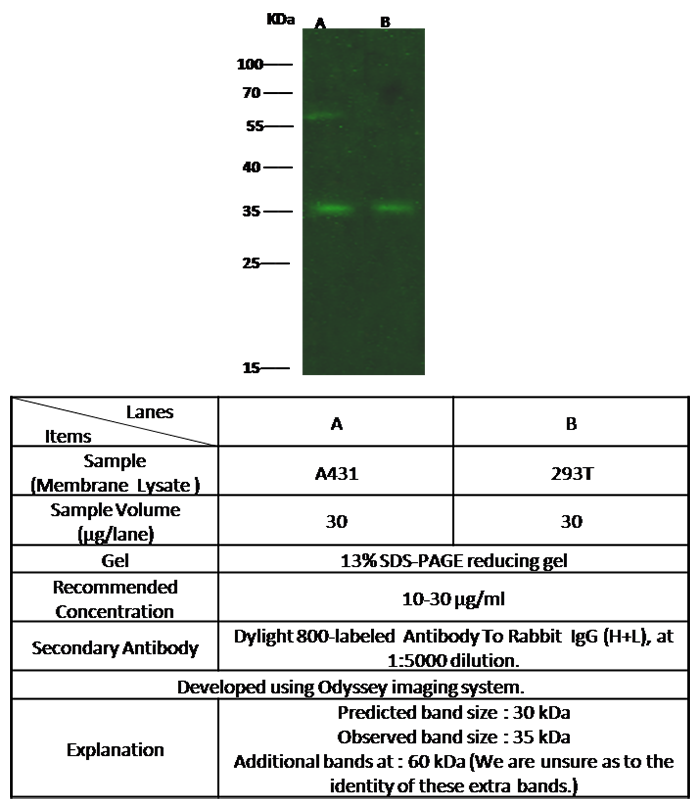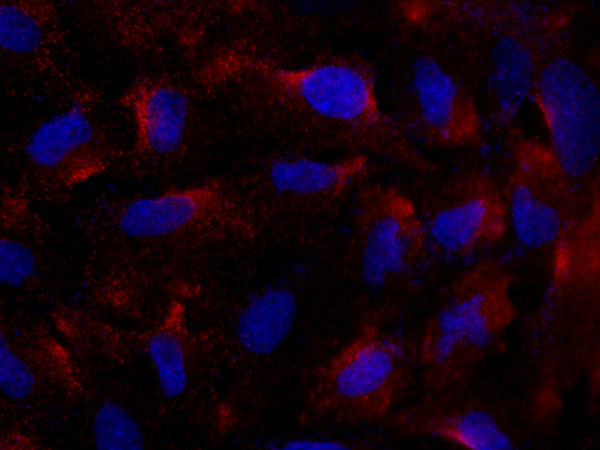-
Product Name
Anti-FcERI / FCER1A antibody
- Documents
-
Description
Rabbit polyclonal to FcERI / FCER1A
-
Tested applications
ELISA, WB, IF, ICC/IF
-
Species reactivity
Human FcERI / FCER1A
-
Alternative names
FCE1A antibody; FcERI antibody; FcERI antibody; Fce1a antibody; Fcr-5 antibody; fcepsilonri antibody; alpha polypeptide antibody; Fc epsilon RI alpha-chain antibody; Fc IgE receptor antibody; FCE1A antibody; Fce1a antibody; Fc-epsilon RI-alpha antibody; fc-epsilon RI-alpha antibody; fcepsilonri antibody; FcERI antibody; FcERI antibody; Fcr-5 antibody; high affinity immunoglobulin epsilon receptor alpha-subunit antibody; high affinity immunoglobulin epsilon receptor subunit alpha antibody; high affinity immunoglobulin epsilon receptor subunit alpha antibody; high-affinity antibody; igE Fc receptor subunit alpha antibody; igE Fc receptor subunit alpha antibody; immunoglobulin E receptor antibody; of mast cells antibody; RP11-550P17.3 antibody
- Immunogen
-
Isotype
Rabbit IgG
-
Preparation
Produced in rabbits immunized with purified, recombinant Human FcERI / FCER1A (rh FcERI / FCER1A; P12319; Met1-Gln205). FcERI / FCER1A specific IgG was purified by Human FcERI / FCER1A affinity chromatography.
-
Clonality
Polyclonal
-
Formulation
0.2 μm filtered solution in PBS
-
Storage instructions
This antibody can be stored at 2℃-8℃ for one month without detectable loss of activity. Antibody products are stable for twelve months from date of receipt when stored at -20℃ to -80℃. Preservative-Free.
Sodium azide is recommended to avoid contamination (final concentration 0.05%-0.1%). It is toxic to cells and should be disposed of properly. Avoid repeated freeze-thaw cycles. -
Applications
WB: 10-30 μg/ml
ELISA: 0.1-0.2 μg/ml
This antibody can be used at 0.1-0.2 μg/ml with the appropriate secondary reagents to detect Human FcERI / FCER1A.
ICC/IF: 0.5-1.5 μg/mL
-
Validations

FcERI / FCER1A Antibody, Rabbit PAb, Antigen Affinity Purified, Western blot

FcERI / FCER1A Antibody, Rabbit PAb, Antigen Affinity Purified, Immunofluorescence
Immunofluorescence staining of FCER1A in A549 cells. Cells were fixed with 4% PFA,blocked with 10% serum, and incubated with rabbit anti-human FCER1A polyclonal antibody (1 µg/ml) at 4℃ overnight. Then cells were stained with the Alexa Fluor®594-conjugate
-
Background
FcERI, also known as FCER1A, is the alpha subunit of the immunoglobulin epsilon receptor (IgE receptor). IgE receptor is a high affinity IgE receptor which plays a central role in allergic disease, coupling allergen and mast cell to initiate the inflammatory and immediate hypersensitivity responses that are characteristic of disorders such as hay fever and asthma. The allergic response occurs when 2 or more IgE receptors are crosslinked via IgE molecules that in turn are bound to an allergen (antigen) molecule. A perturbation occurs that brings about the release of histamine and proteases from the granules in the cytoplasm of the mast cell and leads to the synthesis of prostaglandins and leukotrienes--potent effectors of the hypersensitivity response. IgE receptor is comprised of an alpha subunit(FcERI), a beta subunit, and two gamma subunits. FcERI is glycosylated and contains 2 Ig-like (immunoglobulin-like) domains.
-
References
- Shikanai T, et al. (2002) Sequence variants in the FcepsilonRI alpha chain gene. J Appl Physiol. 93(1):37-41.
- Sada K, et al. (2002) Regulation of FcepsilonRI-mediated degranulation by an adaptor protein 3BP2 in rat basophilic leukemia RBL-2H3 cells. Blood. 100(6):2138-44.
- Takahashi K, et al. (2003) Transcriptional regulation of the human high affinity IgE receptor alpha-chain gene. Mol Immunol. 38(16-18):1193-9.
Related Products / Services
Please note: All products are "FOR RESEARCH USE ONLY AND ARE NOT INTENDED FOR DIAGNOSTIC OR THERAPEUTIC USE"
